Related Research Articles

Nancy Reagan was an American film actress who was the first lady of the United States from 1981 to 1989, as the second wife of President Ronald Reagan, the 40th president of the United States.
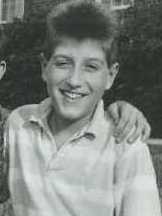
Ryan Wayne White was an American teenager from Kokomo, Indiana, who became a national poster child for HIV/AIDS in the United States after his school barred him from attending classes following a diagnosis of AIDS.

A laugh track is an audio recording consisting of laughter usually used as a separate soundtrack for comedy productions. The laugh track may contain live audience reactions or artificial laughter made to be inserted into the show, or a combination of the two. The use of canned laughter to "sweeten" the laugh track was pioneered by American sound engineer Charles "Charley" Douglass.

Laurence David Kramer was an American playwright, author, film producer, public health advocate, and gay rights activist. He began his career rewriting scripts while working for Columbia Pictures, which led him to London, where he worked with United Artists. There he wrote the screenplay for the film Women in Love (1969) and received an Academy Award nomination for his work.
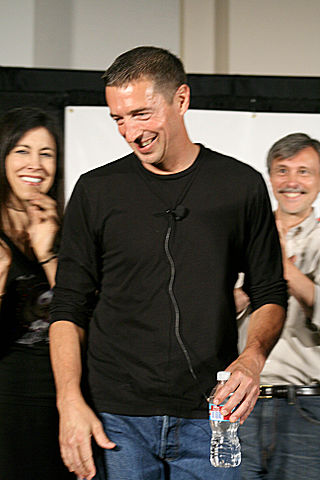
Ronald Prescott Reagan is an American political commentator and broadcaster. Reagan is a former radio host and political analyst for KIRO and Air America Radio, with which he hosted his own daily three-hour show. He has also been a contributor to MSNBC. His liberal views contrast with those of his conservative father, President Ronald Reagan. He has been an outspoken critic of the modern-day Republican Party and has insisted his father would be "ashamed" over the influence of Donald Trump in the Republican Party. Donald Trump has said that Ronald Reagan was one of his influences. Ron Reagan is the only biological son of Ronald Reagan.
The President's Commission on the HIV Epidemic was a commission formed by President Ronald Reagan in 1987 to investigate the AIDS pandemic. It is also known as the Watkins Commission for James D. Watkins, its chairman when the commission issued its final report in 1988.

Anthony Stephen Fauci is an American physician-scientist and immunologist who served as the director of the National Institute of Allergy and Infectious Diseases (NIAID) from 1984 to 2022, and the chief medical advisor to the president from 2021 to 2022. Fauci was one of the world's most frequently cited scientists across all scientific journals from 1983 to 2002. In 2008, President George W. Bush awarded him the Presidential Medal of Freedom, the highest civilian award in the United States, for his work on the AIDS relief program PEPFAR.

Larry Melvin Speakes was an American journalist and spokesperson who acted as White House Press Secretary under President Ronald Reagan from 1981 to 1987. He assumed the role after Press Secretary James Brady was shot on March 30, 1981.

Frances Ann Lebowitz is an American author, public speaker, and actor. She is known for her sardonic social commentary on American life as filtered through her New York City sensibilities and her association with many prominent figures of the New York art scene of the 1970s and 1980s, including Andy Warhol, Martin Scorsese, Jerome Robbins, Robert Mapplethorpe, David Wojnarowicz, Candy Darling, and the New York Dolls.
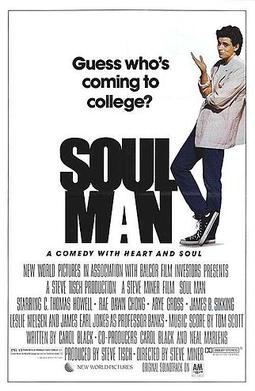
Soul Man is a 1986 American comedy film directed by Steve Miner and written by Carol L. Black. C. Thomas Howell stars as a white male law student who pretends to be black in order to qualify for a scholarship. Its title refers to the song of the same name by Isaac Hayes and David Porter; the original soundtrack includes a version performed by Sam Moore and Lou Reed.
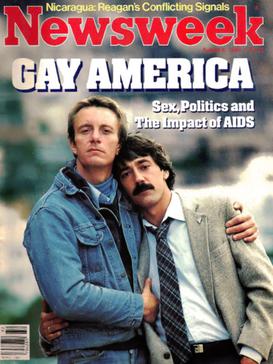
Robert Boyle "Bobbi" Campbell Jr. was a public health nurse and an early United States AIDS activist. In September 1981, Campbell became the 16th person in San Francisco to be diagnosed with Kaposi's sarcoma, when that was a proxy for an AIDS diagnosis. He was the first to come out publicly as a person with what came to be known as AIDS, writing a regular column in the San Francisco Sentinel, syndicated nationwide, describing his experiences and posting photos of his KS lesions to help other San Franciscans know what to look for, as well as helping write the first San Francisco safer sex manual.
"We begin bombing in five minutes" is the last sentence of a controversial, off-the-record joke made by U.S. President Ronald Reagan in 1984, during the Cold War. While preparing for a scheduled radio address from his vacation home in California, Reagan joked with those present about outlawing and bombing Russia. The joke was not broadcast live, but was recorded and later leaked to the public. The Soviet Union criticized the joke, as did Reagan's opponent in the 1984 United States presidential election, Walter Mondale.
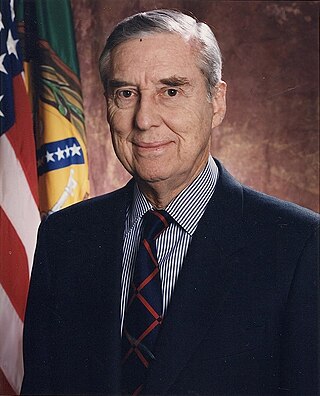
"Senator, you're no Jack Kennedy" was a remark made during the 1988 United States vice presidential debate by Democratic nominee Senator Lloyd Bentsen to Republican nominee Senator Dan Quayle in response to Quayle's comparison of his experience in Congress to that of John F. Kennedy, the Democratic 35th president of the United States, whom Bentsen knew from their time as congressmen from the 80th to 82nd Congresses. Since then, the words "You're no Jack Kennedy," or some variation on the remark, have become a part of the political lexicon as a way to deflate politicians or other individuals perceived as thinking too highly of themselves. Michael Dukakis and Bentsen later went on to lose the 1988 United States presidential election to George H. W. Bush and Quayle, who thus succeeded Bush as vice president of the United States.
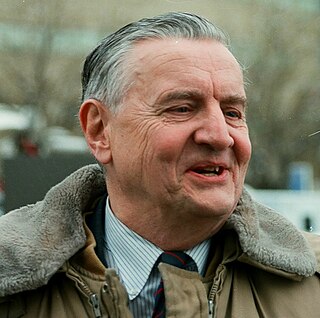
Charles Lester Kinsolving was an American political Episcopal priest, newspaper columnist, and talk radio host, previously heard on WCBM in Baltimore, Maryland. He is known for being the first White House correspondent to ask questions about the HIV/AIDS epidemic during the Reagan administration; he continued to ask questions about the disease even though press secretary Larry Speakes and some other correspondents made light of it; Speakes joked that Kinsolving had an "abiding interest in the disease" because he was "a fairy". Kinsolving first asked questions about AIDS in 1982; President Reagan would not acknowledge the epidemic until 1985, by which time more than five thousand people had died from the disease.
Russian political jokes are a part of Russian humour and can be grouped into the major time periods: Imperial Russia, Soviet Union and post-Soviet Russia. In the Soviet period political jokes were a form of social protest, mocking and criticising leaders, the system and its ideology, myths and rites. Quite a few political themes can be found among other standard categories of Russian joke, most notably Rabinovich jokes and Radio Yerevan.
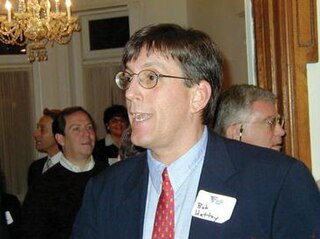
Bob Hattoy was an American activist on issues related to gay rights, AIDS and the environment.
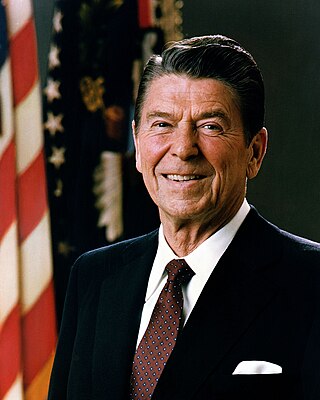
This article discusses the domestic policy of the Ronald Reagan administration from 1981 to 1989. Reagan's policies stressed conservative economic values, starting with his implementation of supply-side economic policies, dubbed as "Reaganomics" by both supporters and detracters. His policies also included the largest tax cut in American history as well as increased defense spending as part of his Soviet strategy. However, he significantly raised (non-income) taxes four times due to economic conditions and reforms, but the tax reforms instituted during presidency brought top marginal rates to their lowest levels since 1931, such that by 1988, the top US marginal tax rate was 28%.
LGBTQ rights organizations are non-governmental civil rights, health, and community organizations that promote the civil and human rights and health of sexual minorities, and to improve the LGBTQ community.
The U.S. National Commission on AIDS was established by a statute enacted November 4, 1988, with the aim of "promoting the development of a national consensus on policy concerning acquired immune deficiency syndrome [AIDS]". It produced several reports over the next 4 years.

Ronald Reagan, the President of the United States from 1981 to 1989, oversaw the United States response to the emergence of the HIV/AIDS crisis. His actions, or lack thereof, have long been a source of controversy and have been criticized by LGBT and AIDS advocacy organizations.
References
- ↑ "Scott Calonico".
- ↑ MUBI
- ↑ Documentary 'When AIDS Was Funny' Shows Reagan Administration's Indifference - Vox
- ↑ Listen to the Reagan Administration Laughing at the AIDS Epidemic - VICE
- ↑ AIDS Was Hilarious to the Reagan White House, Press Corps - New York Magazine
- 1 2 Lawson, Richard (December 1, 2015). "The Reagan Administration's Unearthed Response to the AIDS Crisis Is Chilling". Vanity Fair .
- ↑ Eilperin, Juliette (December 4, 2013) "How attitudes toward AIDS have changed, in the White House and beyond." Washington Post. (Retrieved 7-7-2014.)